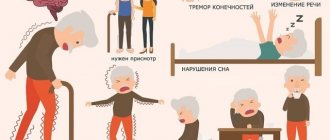What is insomnia?
All this is good in theory, but in practice, many people do not get enough sleep, which means they do not restore their energy supply and risk encountering a number of problems.
Typical situation: you get up early in the morning feeling tired and weak. All day at work you dream about going to bed on time in the evening and getting a great night's sleep. And now - the long-awaited evening. It seems that if you touch your head to the pillow, you will instantly fall asleep. However... instead, you just can’t relax, you toss and turn for hours, counting sheep, trying to fall asleep. As a result, only in the morning you fall into a restless sleep for a couple of hours, and get up again with the feeling that you didn’t even go to bed - everything is repeated in a circle.
If this condition recurs systematically, it looks like you have insomnia. Or, in scientific terms, “insomnia” is a sleep disorder: its duration is too short, its quality is poor, or a combination of both factors. It doesn't matter how many hours you sleep. Each body is individual; for some, 6 hours are enough to feel cheerful and full of energy, while others do not get enough sleep even in 8 hours.
A somnologist of the highest category, Ph.D., shared her expert opinion on sleep disorders and improving its quality. Gorbat Tatyana Vladimirovna
:
– A good solution is to take a nap during the day, as long as it does not impair the quality of your night’s rest. If you haven't had enough sleep and you have the opportunity to take a nap during the day, this will help you gain energy. It is important to ensure that the day's rest is not too long, because this can lead to disruption of the regime.
The main symptom of insomnia is a subjective feeling of insufficient or poor quality sleep. Another important sign is problems falling asleep, early awakenings or restless sleep in favorable conditions. That is, if you don’t sleep because you can’t tear yourself away from the series, because of the noise from your neighbors or the bright light of a street lamp, this is not insomnia.
Symptoms and signs
The main feature of the disease is the absence of the restorative stage of sleep.
Symptoms of sleep disorders are varied:
- difficulty falling asleep - eternal search for a comfortable position, shifting the blanket, etc.;
- waking up in the middle of the night and subsequent lack of sleep;
- drowsiness during the day, irritability and anxiety;
- waking up more than half an hour earlier than expected and not being able to return to sleep, while the important condition is the duration of sleep, by the time of awakening it does not exceed 6.5 hours.
Are you experiencing symptoms of insomnia?
Only a doctor can accurately diagnose the disease. Don't delay your consultation - call
Dangerous consequences
The most unpleasant characteristic of insomnia is the negative consequences for the body. Insomnia greatly affects well-being, work productivity and mood. The consequences of sleep problems can be:
- Stress – lack of sleep increases levels of the stress hormone cortisol. Because of this, a person becomes irritable and nervous.
- Appearance – lack of sleep has a detrimental effect on the condition and color of the skin. Red, swollen eyes do not contribute to attractiveness.
- Excess weight - and it’s not just that “I didn’t go to bed on time - I ate junk food.” After a sleepless night, the body tries to somehow restore strength, so it requires more high-calorie food. Overeating is a faithful companion of insomnia. In addition, some hormones simply aren't produced if you don't sleep, and this greatly affects your metabolism.
- Brain dysfunction – lack of sleep makes it difficult to think clearly, concentrate, and solve even the simplest problems.
- Aging - sleep is necessary for cell regeneration and restoration processes. If this does not happen, the body's systems wear out much faster.
Insomnia also significantly increases the risk of developing a heart attack and stroke, and disrupts the process of bone tissue formation and information processing. Against such an unfavorable background, a variety of diseases can develop.
Content:
- Possible causes of sleep disorders in women
- How does the violation manifest itself?
- Help with female insomnia
- What happens if you ignore insomnia?
Scientists say that the weaker sex is more susceptible to the problem of insomnia. Less deep and interrupted sleep negatively affects the functioning of the cardiovascular and nervous systems, affects the digestive organs, causing gastritis and pancreatitis. Therefore, prevention and treatment of insomnia in women in the initial stages is important.
When should you go to the doctor?
The dangers of insomnia cannot be underestimated. But fighting it on your own is not the best option. Of course, it is worth creating all the conditions for normal sleep: giving up an evening cup of coffee, going to bed at the same time, preferably no later than 23:00. But the most important thing is to find the causes of sleep problems.
– Of course, it is best to consult a somnologist. This is a specialist who diagnoses and treats various sleep disorders. In Belarus, this is a rather rare specialty, so if this is not possible, then you can start by visiting a therapist, who, if necessary, will refer you to more specialized specialists - a somnologist, psychotherapist, neurologist, otorhinolaryngologist,
– Tatyana Vladimirovna Gorbat recommends.
What symptoms should you consult a doctor for?
- Regular problems falling asleep, frequent or too early awakenings - if this situation repeats 3 times a week or more often, it’s time to consult a specialist.
- Constant drowsiness, irritability, fatigue during the day.
- The feeling that you are more often not getting enough sleep than getting proper rest.
- Absent-mindedness, including in solving work issues, without visible external reasons.
- Nightmares - perhaps the body is trying to signal in this way about problems with internal organs.
Headaches in the morning, constant nervousness, sudden and causeless mood swings can be the consequences of insomnia, and in order to eliminate them, you must first understand the causes.
Prevention and prognosis
Measures to prevent insomnia:
- creating sleep stability - a stable time for falling asleep and waking up;
- lack of vigorous movement and caffeine consumption a couple of hours before bedtime;
- morning work-out;
- comfort in the sleeping room - cool and dark;
- maintaining sleep hygiene - the principles of proper and healthy sleep: a positive sleep environment, minimizing sleep during the day, regularity and effectiveness of episodes, minimizing the influence of harmful substances, reducing the influence of medications, etc.
You can make an appointment with the specialists of JSC "Medicine" (clinic of Academician Roitberg) in the center of Moscow (Mayakovskaya metro station) by phone (24 hours a day), filling out the application form on the website or with the clinic administrators at the address: Moscow 2nd Tverskoy-Yamskaya lane .10.
Physiological causes of insomnia
Insomnia can have a variety of causes, but they are all divided into two groups: physiological and psychological.
– It is difficult to single out one specific cause of insomnia, but among the most common is situational insomnia, for example, due to stress or anxiety. Insomnia is also common and is associated with hormonal imbalances (melatonin production), age, pain in chronic diseases,
– said Tatyana Vladimirovna.
The group of physiological reasons includes:
- Diseases accompanied by pain. As a rule, the pain intensifies at night, so the person cannot sleep or constantly wakes up.
- Disturbances in the functioning of the thyroid gland - there is even a special term “hormonal insomnia”, it develops against the background of a failure in the production of hormones.
- Menopause in women is another manifestation of hormonal imbalance plus fever, sweating, and rapid heartbeat.
- Diabetes mellitus - a decrease in blood sugar concentration triggers a protective mechanism. A person wakes up with a feeling of intense hunger and profuse sweating.
- Apnea is cessation of breathing during sleep. Breathing stops, and the person wakes up, and then cannot fall asleep for a long time. This condition can be life-threatening.
Other physiological causes are restless legs syndrome, which often develops during pregnancy, iron deficiency in the body and kidney failure, as well as difficulty breathing in bronchial asthma.
Cost of services
| CONSULTATIONS OF SPECIALISTS | |
| Initial consultation with a psychiatrist (60 min.) | 6,000 rub. |
| Repeated consultation | 5,000 rub. |
| Consultation with a psychiatrist-narcologist (60 min.) | 5,000 rub. |
| Consultation with a psychologist | 3,500 rub. |
| Consultation with Gromova E.V. (50 minutes) | 12,000 rub. |
| PSYCHOTHERAPY | |
| Psychotherapy (session) | 7,000 rub. |
| Psychotherapy (5 sessions) | 30,000 rub. |
| Psychotherapy (10 sessions) | 60,000 rub. |
| Group psychotherapy (3-7 people) | 3,500 rub. |
| Psychotherapy session with E.V. Gromova (50 minutes) | 12,000 rub. |
This list does not contain all prices for services provided by our clinic. The full price list can be found on the “Prices” , or by calling: 8(969)060-93-93. Initial consultation is FREE!
Drug treatment of female insomnia
The use of medications is resorted to in cases where other methods of correcting sleep disorders do not bring the desired result. Taking sleeping pills always starts with a minimum dose, which is gradually increased until the desired effect is achieved. At the same time, the doctor always remains in touch with the patient for timely identification of adverse reactions, dosage adjustment or medication replacement. The medication is also discontinued by slowly reducing the daily dose.
The specific drug is selected depending on the underlying cause of the disease. For severe, protracted forms of female insomnia, neuroleptics, antidepressants, and tranquilizers . For minor violations, safe herbal remedies based on valerian and motherwort are sufficient. To correct sleep and wakefulness, medications containing a synthetic analogue of melatonin (the so-called “sleep hormone”, which is actively produced in the body at night) are used. Such medications do not have a pronounced hypnotic effect, but help normalize the circadian rhythm.
Don't wait for complications! Call us right now at 8(969)060-93-93 and sign up for a consultation!
Psychological reasons
If there are no pathologies, but insomnia is present, the reasons may be psychological. For example, severe anxiety, nervous tension, and stress can deprive sleep for a long time or make it intermittent. Neuroses, anxiety, and depression also prevent you from getting enough sleep.
Sleep problems appear in people who have spent a long time solving an important problem. Here the mechanism of inertia kicks in, and the brain cannot relax for a long time. Sometimes sleep problems are the result of a genetic predisposition.
What else causes insomnia?
There are several external causes of insomnia. It is very likely that your sleep will not be normal if you:
- You are constantly awake at night - working or having fun in clubs.
- Change time zones frequently.
- Are you fond of coffee, tea, alcoholic drinks?
- Smoke, especially before bed.
- I prefer to exercise late in the evening.
- Watch horror movies regularly.
Sometimes insomnia occurs due to traumatic brain injury or abuse of medications, such as tranquilizers or sedatives.
How is insomnia treated?
The first task of a somnologist in treating insomnia is to identify the causes of the problem. To do this, the doctor:
- Collects anamnesis - finds out the features of lifestyle, possible psychological causes of insomnia.
- Conducts an examination - assesses blood pressure, pulse rate, skin condition and other parameters indicating general health.
- Prescribes tests or examinations to identify hidden disorders in the body.
- Refers, if necessary, for consultations with specialized specialists.
Polysomniography can be used to identify the causes of insomnia. Using special equipment, a sleeping person’s body position, respiratory flow, movement of arms and legs, chest, and abdominal wall are analyzed. Electroencephalography and ECG, as well as other types of scans, are performed simultaneously. Based on the results of the examination, a hypnogram is formed - a curve that provides comprehensive information about the structure of sleep. With its help, the doctor determines features and characteristics, records periods of insomnia, and analyzes the quality and phases of sleep.
Diagnostic methods
An objective examination necessarily includes polysomnography . This technique allows you to simultaneously monitor and record several parameters: the results of electroencephalography, electromyography, electrocoagulography, ECG. This is enough for a comprehensive assessment of sleep structure and determination of the possible etiology of the disease.
In addition, it is necessary to exclude toxic and somatic causes of the disease. For this purpose, general clinical tests, ultrasound, tomography and other studies are prescribed. When diagnosing, doctors also use a variety of questionnaires and questionnaires, modern methods of psychological testing.







